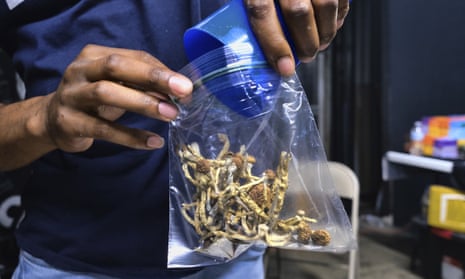A California lawmaker has introduced legislation that would decriminalize psychedelics in the state, the latest bold step in a movement to end America’s war on drugs.
Scott Wiener, the state senator who authored the bill, hopes that in following the lead of places such as Oakland, Santa Cruz and the District of Columbia – all cities which have decriminalized psychedelics – California will move one step closer to decriminalizing the use and possession of all drugs, something that Oregon passed by voter initiative in November.
“People should not be going to jail for possessing or using drugs,” Wiener told the Guardian. “It’s a health issue, not a criminal issue, and I hope that we get all the way there.”
This bill, unveiled on Thursday, would decriminalize possession and personal use of psilocybin, psilocyn, MDMA, LSD, ketamine, DMT, mescaline and ibogaine – all drugs that can be used for medical treatment. While the decriminalization would apply for any kind of possession or use, not just medical, the bill makes a point to tout the medical benefits of psychedelics, a strategy familiar to drug policy reform advocates.
“That’s how it worked with cannabis,” said Anthony Johnson, a longtime advocate and chief petitioner for Oregon’s Measure 110, the initiative that decriminalized personal possession of small amounts of all illicit drugs. “It’s definitely a way to help people that need it first and foremost, but also then to educate the public about these substances of how the drug war has been a failed policy and how there is a better approach.”
The bill would also expunge criminal records for people convicted of possession or personal use of these substances. It would create a taskforce to recommend which regulatory body would oversee personal and therapeutic use of these substances for mental health treatment.
Wiener did not include peyote as one of the substances because of a shortage of the drug among indigenous practitioners, he said. Peyote is a sacred plant for many indigenous tribes, and at the behest of the native community, the bill will not decriminalize peyote, or mescaline when it is sourced from peyote.
Breaking down stereotypes
In his advocacy, Johnson found that the biggest opponent of decriminalization have been law enforcement, who cite public safety concerns, and those in the private rehabilitation industry. Wiener hopes that testimony from veterans – the bill is sponsored by two groups who help them with PTSD – and therapists who support the therapeutic use of psychedelics will break down prejudices about psychedelics users.
“There’s a stereotype of who’s using psychedelics, but it’s much broader than that and when you have veterans coming into the Capitol talking about how psychedelics help them with PTSD and help them get their lives back, that’s incredibly powerful for legislators,” he said.
Juliana Mercer, 38, is one of those veterans. She graduated boot camp one week before September 11. In her 16 years as a Marine, 10 of which she was active duty, she served two tours: one in Iraq and one in Afghanistan.

Most of her time involved civil affairs, working with local communities and learning of the devastation of war first-hand. For four years, she was in the wounded warriors unit, providing support and services to injured Marines and their families.
“I lost quite a few friends and just saw a lot of a lot of damage and destruction along the way,” said Mercer, who described the experience as leaving her with lingering, unaddressed trauma. “I put all of that stuff away and kind of forgot about it for a while, and once I slowed down it was all just sitting there and I didn’t know what to do with it.”
Mercer’s first foray into psychedelics was recreational. But her experience gave her a feeling of connectedness that she had not felt for a long time, spurring her to reach out to the Heroic Hearts Project, a group that specializes in ayahuasca therapy with military veterans, about a year and a half ago.
Her first session exceeded anything she had expected, releasing “years of grief”.
“I kept hearing that when you do some of these plant medicines, you’ll be able to do 10 years worth of work in one session,” Mercer said. “Just one of my sessions really brought out all of that pain and the grief that I didn’t even know was in there and allowed me to just completely release it and expel it, things that I had no idea were there.”
With the help of her coach and therapist, Mercer was able to “unpack why I was so stuck”.
“It had nothing to do with not knowing who I was or what direction to go, it had to do with just being bogged down with all of these things,” she said.
Lauren Taus, a licensed clinical social worker who facilitates ketamine therapy, is adamant that plant medicine therapy is only a potent tool, not a solution, in mental health work – but one that should be decriminalized as soon as possible.
“We are in a mental health crisis and Covid-19 has exacerbated what was already a crisis,” Taus said. “And the causes of trauma are multiplying way faster than the solutions. Current treatment is generally not very effective. Psychedelic medicine has been engaged with globally for eons. This stuff works and we deserve to have access to solutions that will be sustainable.”
